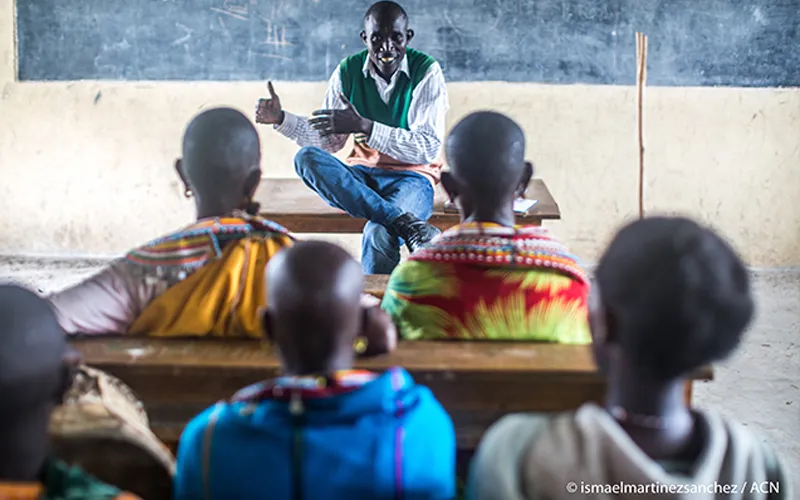He has told ACN that most of his family members were not able to escape alive in the conflict.
“My father, my sister and my brother were all murdered. It all happened in the space of a few minutes,” he tells ACN.
He was able to flee into the neighboring country of Uganda, where more than one million people are living in refugee camps. These are people who are living with scars they got from witnessing the killing of their loved ones. Most are in constant need of revenge.
Catechist Gazi has become a symbol of peace among the refugees, teaching them about healing and forgiving their enemies.
Making reference to the refugees, including those who were forced to become child soldiers, the South Sudanese Catechist says, “Many are filled with hate and thoughts of revenge. I talk to them about forgiveness.”
(Story continues below)
ACN reports that Catechist Gazi has completed his training and now prefers to call himself an “evangelist”, bringing the Good News to the poor and desperate.
He was supported by the charity organization to undergo training at the Emmaus Centre in the Catholic Diocese of Kasana-Luweero, near the Ugandan capital city, Kampala.
“At the centre (Emmaus), young people are trained to heal the wounds inflicted on the souls of their people and to stand by them as they overcome diverse hardships, another ‘battle’, but a completely different and more promising one than the embittered fighting raging in his homeland,” ACN reports.
Catechist Gazi professes, “I am now a soldier for Jesus. I am fighting to return souls to God… Thanks to my training as a Catechist, which was made possible by ACN, I am now able to bring hope and love to my people.”
In an Apostolic letter “Antiquum ministerium” issued May 11 to institute the ministry of Catechists, Pope Francis notes that the ministry in the Church is an ancient one, dating back to the roles that were performed by “teachers” in the New Testament.
“The history of evangelization over the past two millennia clearly shows the effectiveness of the mission of Catechists,” Pope Francis says, and explains, “Bishops, priests and deacons, together with many men and women in the consecrated life, devoted their lives to catechetical instruction so that the faith might be an effective support for the life of every human being.”
Establishing the lay ministry of Catechist, the Holy Father invited all Episcopal Conferences “to render effective the ministry of Catechist, determining the necessary process of formation and the normative criteria for admission to this ministry.”
Agnes Aineah is a Kenyan journalist with a background in digital and newspaper reporting. She holds a Master of Arts in Digital Journalism from the Aga Khan University, Graduate School of Media and Communications and a Bachelor's Degree in Linguistics, Media and Communications from Kenya's Moi University. Agnes currently serves as a journalist for ACI Africa.








